Search Thermo Fisher Scientific
Invitrogen
CD68 Monoclonal Antibody (eBioY1/82A (Y1/82A)), Alexa Fluor™ 647, eBioscience™
This Antibody was verified by Knockout to ensure that the antibody binds to the antigen stated.
FIGURE: 1 / 24
CD68 Antibody (51-0689-42) in Flow
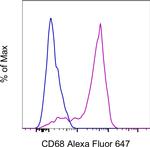

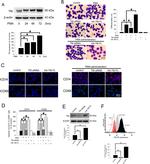
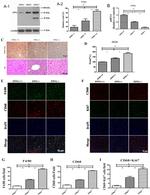
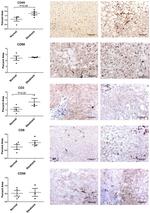
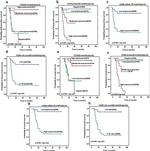
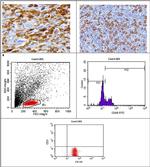


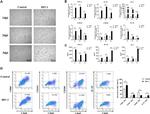
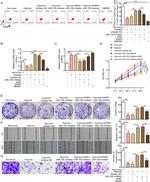
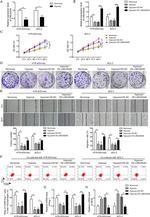
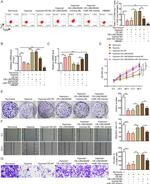
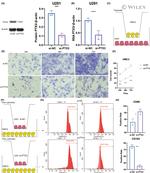
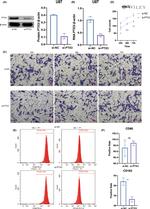
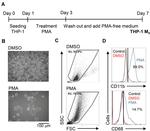
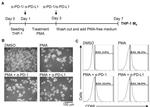
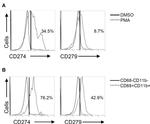


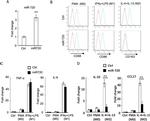
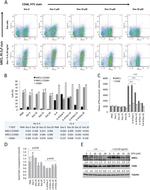
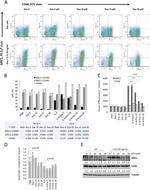
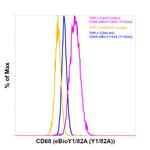
Product Details
51-0689-42
Species Reactivity
Published species
Host/Isotype
Recommended Isotype Control
Class
Type
Clone
Conjugate
Excitation/Emission Max
Form
Concentration
Purification
Storage buffer
Contains
Storage conditions
Shipping conditions
RRID
Product Specific Information
Description: The eBioY1/82A antibody reacts with CD68 which belongs to the sialomucin family and is closely related to the family of lysosomal-associated membrane proteins (LAMPs) and scavenger receptor. CD68 is predominantly an intracellular protein, found mainly in the late endosomal compartment but can be detected in smaller amounts on the surface of cells of mainly myeloid derived cells; monocytes and macrophages, dendritic cells (and in some Langerhans cells), neutrophils, basophils mast cells, myeloid progenitor cells, and a subset of CD34+ hemopoietic bone marrow progenitor cells. The function has not been fully elucidated but based on its homology and structure suggests a role in antigen processing or presentation and protection of the lysosomal membrane from hydrolytic enzymes. Reports have also seen expression in activated T cells, and about 40% of peripheral blood B-lymphocytes and 50% of all B-ALL.
Staining with eBioY1/82A shows surface staining on B cells and a minor percentage of monocytes while intracellular staining results in about 50% of B cells and most monocytes.
Applications Reported: This eBioY1/82A (Y1/82A) antibody has been reported for use in intracellular staining followed by flow cytometric analysis.
Applications Tested: This eBioY1/82A (Y1/82A) antibody has been pre-diluted and tested by intracellular staining followed by flow cytometric analysis of normal human peripheral blood cells using the Intracellular Fixation & Permeabilization Buffer Set (Product # 88-8824-00) and protocol. Please refer to "Staining Intracellular Antigens for Flow Cytometry, Protocol A: Two step protocol for intracellular (cytoplasmic) proteins" located at Flow Protocols. This may be used at 5 µL (0.125 µg) per test. A test is defined as the amount (µg) of antibody that will stain a cell sample in a final volume of 100 µL. Cell number should be determined empirically but can range from 10^5 to 10^8 cells/test.
Excitation: 633-647 nm; Emission: 668 nm; Laser: Red Laser.
Target Information
CD68 (Macrosialin) is a 110 kDa integral membrane glycoprotein predominantly expressed on the intracellular lysomsomes of monocytes and macrophages and to a lesser extent by dendritic cells and peripheral blood granulocytes. Also, CD68 could play a role in phagocytic activities of tissue macrophages, both in intracellular lysosomal metabolism and extracellular cell-cell and cell-pathogen interactions. CD68 is expressed by interdigitating reticulum cells in tonsil and some histiocytic lymphoma or histiocytosis, acute myeloid leukemia (AML), and granulocytic sarcoma. Elevated expression of CD68 has been demonstrated on CD34+ cells in various human malignancies, including several Acute Myeloid Leukemia studies.
For Research Use Only. Not for use in diagnostic procedures. Not for resale without express authorization.
How to use the Panel Builder
Watch the video to learn how to use the Invitrogen Flow Cytometry Panel Builder to build your next flow cytometry panel in 5 easy steps.
Bioinformatics
Protein Aliases: CD68; CD68 antigen; Gp110; macrophage antigen CD68; Macrosialin; scavenger receptor class D, member 1
Gene Aliases: CD68; GP110; LAMP4; SCARD1
UniProt ID: (Human) P34810
Entrez Gene ID: (Human) 968

Performance Guarantee
If an Invitrogen™ antibody doesn't perform as described on our website or datasheet,we'll replace the product at no cost to you, or provide you with a credit for a future purchase.*
Learn more
We're here to help
Get expert recommendations for common problems or connect directly with an on staff expert for technical assistance related to applications, equipment and general product use.
Contact tech support

